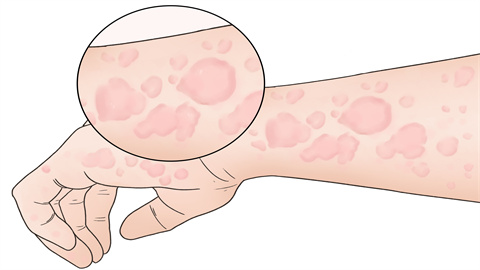What causes eczema during pregnancy?
Generally, eczema during pregnancy may be caused by factors such as hormonal changes, dry skin, contact dermatitis, atopic dermatitis, urticaria, and others. Prompt medical attention is advised, and treatment should follow medical guidance. Details are as follows:

1. Hormonal changes: Hormone levels in pregnant women change significantly, including a rapid increase in estrogen, progesterone, and human chorionic gonadotropin. These hormonal fluctuations can affect the skin's sebum production and immune barrier function, making the skin more susceptible to external irritants and infections, thereby triggering eczema. It is important to keep the skin clean and dry and to use mild, non-irritating skincare products.
2. Dry skin: Skin dryness during pregnancy may be caused by insufficient hydration, reduced sebum production, or dry climatic conditions. Dry skin can impair the skin's barrier function, making it more vulnerable to external irritants and infections, which may lead to eczema. Pregnant women should enhance skin moisturization and choose mild moisturizing products, such as moisturizing creams containing glycerin, hyaluronic acid, and other ingredients.
3. Contact dermatitis: Contact dermatitis is an allergic reaction that occurs when the skin comes into contact with allergens such as pollen, dust mites, or animal dander. This allergic reaction can cause skin inflammation and eczema, often accompanied by itching. Anti-inflammatory and antipruritic treatments should be administered under medical guidance, using medications such as calamine lotion, mupirocin ointment, and clobetasol propionate cream.
4. Atopic dermatitis: Atopic dermatitis is a chronic inflammatory skin condition associated with a hereditary allergic constitution. Due to hormonal changes and dry skin during pregnancy, pregnant women are more prone to develop atopic dermatitis, which can lead to eczema and may also be accompanied by skin dryness. Anti-inflammatory and immunomodulatory treatments should be administered under a physician's guidance, using medications such as tacrolimus ointment, hydrocortisone butyrate cream, and mometasone furoate cream.
5. Urticaria: Urticaria is a localized edematous reaction caused by the dilation of small blood vessels and increased permeability in the skin and mucous membranes. During pregnancy, hormonal changes and immune dysfunction make pregnant women more susceptible to developing urticaria, which can in turn trigger eczema and may also be accompanied by wheals. Treatment should follow medical advice and may include medications such as ephedrine and diphenhydramine tablets, cetirizine hydrochloride tablets, and fexofenadine hydrochloride tablets.
Pregnant women should maintain clean and moisturized skin, avoiding contact with allergens and irritants to prevent the occurrence and exacerbation of eczema.
References:
1. Feng Youji, Shen Keng. Obstetrics and Gynecology [M]. 3rd ed. Beijing: People's Medical Publishing House, 2015.
2. Zhang Xuejun. Dermatology and Venereology [M]. 9th ed. Beijing: People's Medical Publishing House, 2018.









